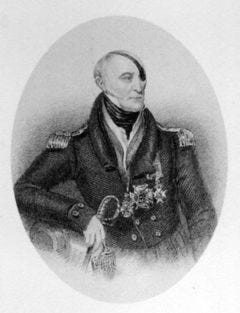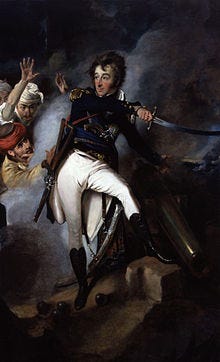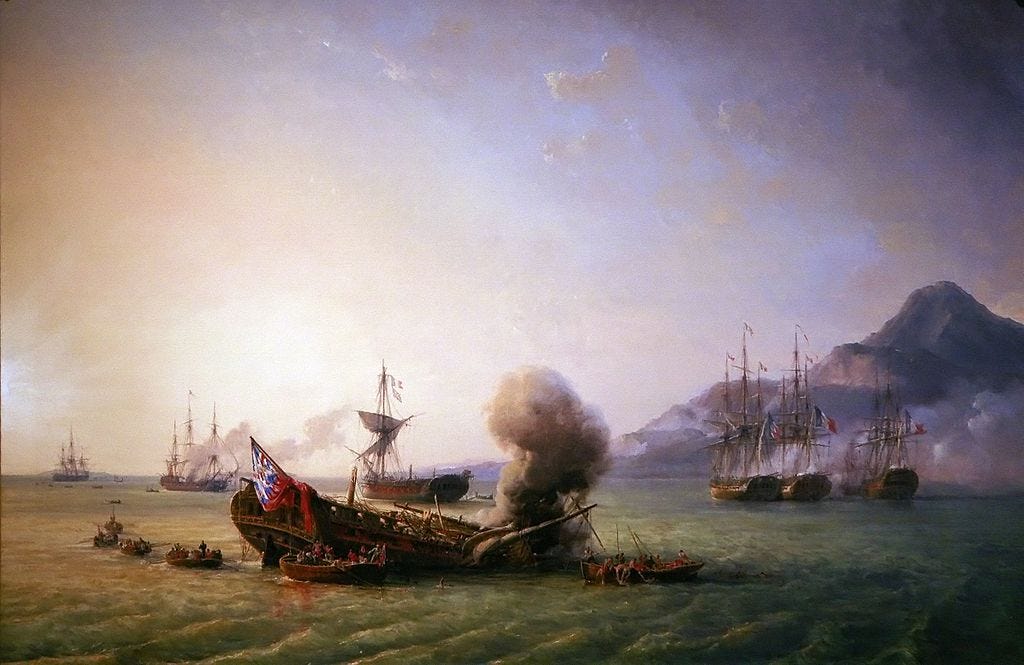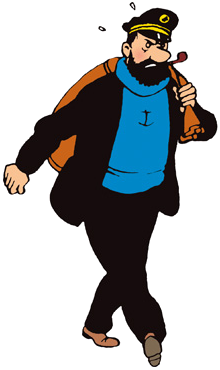The Mauritius Command
Harmony and discord in the fourth Aubrey-Maturin novel
[The musical analogy unfolded here pleases me, and perhaps overlaps in interesting ways with my other theory by which Jack is associated with the Anglo-Saxon and Stephen with the Latinate (this is, as I type it, even more literal than I might have realized, since Jack is presented as the pure Anglo-Saxon while Stephen is a half-Celt, half-Catalan who “talks foreign” to the admiration of all). Rereading the novel, though, I was struck more forcibly than ever by its portrait of Lord Clonfert, who like James Dillon from Master and Commander suffers from a case of low self-esteem that—SPOILER—eventually proves fatal. To be an Irish officer in the Royal Navy is an emotionally risky proposition, even if one is not also a Catholic (actually, Stephen’s Catholicism may provide him with a layer of psychic insulation, preventing him from identifying with the Navy to the degree Jack does). Like Dillon, Clonfert suffers from something similar to W.E.B. Du Bois’s idea of “double consciousness” or the alienated colonial subjecthood described by Frantz Fanon—his struggle to be more English than the English and more Jack Aubrey than Jack Aubrey himself leads him into suicidal risks. On my first go-round I was more concerned with how Dillon and Clonfert serve as foils to Jack, whose natural heroism they can only aspire to. Now I see in them Stephen’s dilemma. He is a living contradiction, an anti-colonial revolutionary in the service of Empire, and the contradiction weighs heavily on him, manifesting in his opium addiction, his occasional shocking lapses into violence, and his consuming passion for an unattainable Englishwoman. Much to explore, there! For now, please enjoy this take on one of the most self-contained novels in the series!—JC 8/16/25]
1
Performance of the adagio, with and without ornaments, of Arcangelo Corelli’s Violin Sonata #3 in C major, one of Jack and Stephen’s favorite pieces.
The musicians in the clip above don’t much resemble Jack or Stephen, but they do handle their respective instruments well: Jack plays violin, Stephen the cello, and the two instruments do as much to characterize them as their words and actions. In the adagio from Corelli’s C-major sonata—played for the first time by our heroes in The Mauritius Command—violin and cello hand off the melody to one another, as in the novels the plots and subplots are handed off from one character to the other and back again. Their instruments suit their temperaments, even as they suggest a certain comic incongruousness: the massive Jack Aubrey sways cradling his comparatively tiny violin under his chin as meager Stephen Maturin hugs his cello between his knees, the cabin they play in rocking to the swell of the sea and Jack’s steward Preserved Killick grumbling in the next room: “There they are, at it again. Squeak, squeak; boom, boom. And when they do start a-playing, it’s no better. You can’t tell t’other from one. Never nothing a man could sing to, even as drunk as Davy’s sow.”
The characters’ instruments are analogous to the roles they play in the series. Most of the time the violin is the leader, the bearer of the melody; though capable of extreme passion it is a more light and spritely instrument than the comparatively somber cello, which in many classical compositions provides a counterpoint or keeps the beat. This clip from Master and Commander: The Far Side of the World perfectly captures the usual or apparent relationship between violin and cello, Captain and Doctor. The Doctor’s plucking creates the background, the environment within and above which the violin swoops and sings:
To carry the analogy forward, most of the time the novels are led by Jack’s violin—a melodic throughline of battle and adventure. The cello beating in the background evokes the complex and melancholy unconscious of the novels that at times threatens to overwhelm the melody or even to replace it. The violin drives the plot. The cello enriches and shadows that plot.
Some of the volumes are cello novels—Post Captain, for example, with its focus on love and friendship and its rather shaggy structure that thrusts Jack’s naval career into a subordinate position to the marriage plot. Even H.M.S. Surprise I’d characterize as a cello novel, since Stephen’s misadventures and heartbreaks take clear precedence over the comparatively rudimentary naval plot. Master and Commander, on the other hand, is a violin novel, in which Stephen is a comparatively minor character and the story focuses tightly on the challenges and opportunities of Jack’s first command.
I happen to prefer the cello—it’s my favorite instrument to listen to—and I take a special interest in those novels that offer the greatest range for its complexity and its darkness. Of course it’s the harmony between the instruments that gives the series its piquancy. Without Jack’s violin, we’d have sturdy replicas of the Victorian novel—Dr. Maturin’s Middlemarch. Without Stephen’s cello, it’s C.S. Forester all over again—adventure stories for superannuated boys. Together, they make up something unique and perpetually fresh.
2

The Mauritius Command is a violin novel: Jack is the hero, as he was in Master and Commander, and Stephen, though more directly involved in the mission than usual in his capacity as spy, is largely relegated to the position of observer and commenter. As in Master and Commander there is a third character, almost amounting to a third protagonist, who is a source of conflict and tension: Lord Clonfert, a dashing but terribly insecure subordinate of Jack’s whose drive for glory, like that of James Dillon in M&C, tries to compensate for a divided and incomplete self. He is also, like Dillon, closely associated with Ireland: his parents were English, but his father’s Irish title (bestowed by the English and considered inferior to an English title) put him in an ambiguous position with regard to his identity. Stephen reflects on what he’s learned about this flashy, overreaching, yet in some ways sympathetic man:
[H]e seems to have sucked in the worst of both sides. On the one hand he derived his notion of himself as a lord from people who have had to cringe these many generations to hold on to the odd patch of land that is their only living; and on the other, though half belonging to them, he has been bred up to despise their religion, their language, their poverty, their manners and traditions. A conquering race, in the place of that conquest, is rarely amiable; the conquerors pay less obviously than the conquered, but perhaps in time they pay even more heavily, in the loss of the humane qualities. Hard, arrogant, profit-seeking adventurers flock to the spoil, and the natives, though outwardly civil, contemplate them with a resentment mingled with contempt, while at the same time respecting the face of conquest – acknowledging their greater strength. And to be divided between the two must lead to a strange confusion of sentiment.
The tension between authority on the one hand and common humanity on the other is one of the series’ perpetual themes; Stephen often wonders whether Jack’s qualities as a leader of men will not ultimately injure those human qualities for which Stephen loves him. The open question amounts to a kind of study of masculinity in its toxic and more virtuous forms. Clonfert is presented as a victim of the former. “In Clonfert’s case,” Stephen reflects, “the result of this and of other factors seems to me an uneasy awareness of his own distinction (he often mentions it), a profound uncertainty of its real value, and a conviction that to validate its claims he should be twice as tall as other men. In spite of his high heels, both literal and figurative, he is not twice as tall as other men: Jack, in particular, tops him by a head and more.” In the view presented by Clonfert’s most loyal retainer, the irascible proto-Freudian drunkard Dr. McAdam, Clonfert’s “entire life is an unsatisfactory pretence: a puppet vainly striving to be another puppet, equally unreal – the antithesis of Jack, who has never played a part in his life, who has no need for any role.”
Jack comes to be regarded by Clonfert with a special animus, and not only because Jack witnessed his possibly dishonorable behavior when they were much younger men. Jack’s apparently effortless inhabitation of his own identity as hero drives Clonfert to distraction, manifesting in painful psychosomatic symptoms as well as the mania that leads him to take greater and greater personal risks. In an odd way, O’Brian shows his hand as author with his creation of this character: the all-too-human Clonfert is driven mad by his efforts to compete with a Jack Aubrey who is literally too good to be true. It’s as if one of Dostoyevsky’s desperate neurotics found himself in a Tolstoy novel, driven to suicidal extremity by the comparative sanity of his surroundings. To revert to my analogy, Clonfert is a second violin incapable of following the lead of the first, and not simply because the first is a virtuoso; it’s as if the first violin’s part had been written for purer notes than any mere mortal could play.
3
H.M.S. Surprise ended with Jack and Sophie homeward bound to “pure paradise”; The Mauritius Command begins something like eighteen months later in circumstances that are anything but paradisal. We arrive with Stephen Maturin (on a horse this time, not a mule) at the dismally situated and terribly overcrowded Ashgrove Cottage in which Captain Aubrey lives with his wife, their twin baby girls, a niece (the child of Sophia’s impetuous younger sister, who has gone off to follow her soldier husband as Lydia follows Wickham in Pride and Prejudice), Jack’s formidable mother-in-law, who has lost all her property to financial chicanery, and a harassed maidservant who immediately quits the premises.
Jack looked after her, and observed in a low voice, ‘That makes the fourth this year. It is the damnedest thing, Stephen: I managed a ship’s company of three hundred odd as easy as kiss your hand, but I cannot get the least notion of discipline into this establishment.’ He paused, brooding, and added, ‘You know very well I was no friend to the cat at sea; but rot me, I can see it has its uses.’
The garden Jack had dreamed of in the Indian Ocean is a shambles, he’s concerned that his girls aren’t quite right in the head, and, without a command, he must maintain all these people on a half-pay salary that amounts to something in the neighborhood of 200 pounds a year. On top of this, marriage is not at all what Jack had cracked it up to be. He tells Stephen, “The trouble is that I had somehow got the wrong notion of marriage. I had thought there was more friendship and confidence and unreserve in it than the case allows.” And his ardent sexual desires are going ungratified—when he expresses his longing for a boy, and Stephen assures him of the likelihood of the next child being male, he responds flatly: “‘There is no likelihood of another. None at all,’ said Jack. ‘You have not been married, Stephen – but I cannot explain – should never have mentioned it.’”
Jack the hero is larger than life, but O’Brian is too much of a realist to give us a happily-ever-after where men and women are concerned. This is the cello’s sting. In Sophia, Jack has his heart’s desire, but the marriage is imperfect, like all earthly things. Both Jack and Sophia wish profoundly for Jack to be given a new command, though they would never admit it to each other in so many words. He must return to sea, and right soon, if his domestic happiness is to have any chance of being fulfilled.
Fortunately Dr. Maturin has brought along with him just such a deus ex machina, though he remarks irritably that “I am extremely averse to appearing in the role of fairy godmother.” In his capacity as intelligence agent he brings orders for Aubrey to assume the command of a frigate, HMS Boadicea, and to proceed in her to Cape Town at the southern tip of Africa. There he shall assume command of a squadron tasked with the conquest of two French-controlled islands, La Réunion and Mauritius (aka Ile de France), which threaten the trade of the East India Company. He will carry with him a Mr. Farquhar, His Majesty’s designated governor of the islands should they fall, and Dr. Maturin will accompany him to offer political advice. As the commander of a squadron, Jack will receive a temporary promotion to the post of commodore—a kind of hemi-semi-demi admiral to whom other commanders and post captains must report. Lord Clonfert will be one of those commanders.
4

As in Master and Commander, Stephen’s literal and metaphorical detachment from the main ship creates opportunities for confidences and observations of a tormented Irishman. For a time Lord Clonfert, suffering from a psychosomatic tormina (“a wretched and unmanly disease,” he complains), becomes Stephen’s patient, in consultation with the festering but brilliant Dr. McAdam. But it takes a curious reversal of their roles for Stephen to truly come to know the man: while transferring from the Boadicea to Clonfert’s Nereide, Stephen falls overboard (not for the first and certainly not for the last time) and is injured pretty badly before he can be recovered. Clonfert puts Stephen up in his own cabin, visits him frequently, and proves to be a better physician to him than McAdam could ever be:
The captain spent many hours at Stephen’s bedside: their conversation was desultory and for most part of no great consequence; but Clonfert was capable of an almost female delicacy – he could be quiet without constraint, and he always knew when Stephen would like a cooling drink or the skylight opened – and they talked about novels, the more recent romantic poetry, and Jack Aubrey, or rather Jack Aubrey’s actions, in a most companionable way; and at times Stephen saw, among the various persons that made up his host, a gentle, vulnerable creature, one that excited his affection.
Clonfert’s vulnerability, Stephen reflects, makes him attractive to women; but as McAdam observes, “Certainly men affect him far more than women; he has more women than he can do with – they pursue him in bands – they cause him much concern – but it is the men he really minds: I have seen it again and again.” Clonfert surrounds himself with officers of inferior character who flatter him continuously; he dresses his boatmen in costumes so outlandish that Jack Aubrey won’t permit one of them aboard his ship; he tells outrageous lies, as when he insists to Stephen that the narwhal’s horn in Clonfert’s cabin came from a unicorn, shot by Clonfert’s old commander Sydney Smith and cut out of the beast’s head by Clonfert himself. He is puffed up, a popinjay; yet as Jack observes ruefully more than once, he has real abilities as a seaman and as a commander. “Why does he have to be Alexander?” grumbles McAdam.
Clonfert’s dream of himself as a second Cochrane who might out-Aubrey Aubrey is a mark of his hollowness and sense of inadequacy—the story about the unicorn’s horn is certainly telling in a Freudian sort of way. Though he seems to have vibed with Sydney Smith (one of the most flamboyant commanders in the history of the Royal Navy), Clonfert seems incapable of existing harmoniously with his peers (Aubrey observes that he “seems to have a genius” for falling out with his peers), his superiors, or with subordinates unwilling to abase themselves. As Stephen notes, he is capable of “an almost female delicacy” and intuition when tête-à-tête, but this quality vanishes the moment a third party enters the room and Clonfert can feel himself observed. Clonfert’s sense of self is a will-o-the-wisp. Talking to Stephen in his cabin, Clonfert paces between a pair of large mirrors; Stephen noticed “that at each turn Clonfert automatically glanced at his reflection with a look of inquiry, doubt, and complacence.” The image is Hitchcockian. Clonfert cannot escape his own gaze, a cognitive dissonance that will be his undoing.
5

Most of Jack Aubrey’s naval adventures to this point in the series have had a historical precedent: H.M.S. Sophie’s audacious capture of the Spanish xebec-frigate Cacafuego was modeled on Lord Cochrane’s 1801 capture of a similar ship in his sloop H.M.S. Speedy; the capture of the Spanish treasure fleet at the end of Post Captain is based on the 1804 Battle of Cape Saint Maria; the ruse by which a fleet of merchant ships intimidated and drove off a French squadron in H.M.S. Surprise was performed in reality not by a Royal Navy captain but by a merchant captain named Nathaniel Dance. But The Mauritius Command is the first novel in the series to be closely based on an entire historical campaign; as a result, many of the secondary characters have the names of real people, including the disingenuous Admiral Bertie, the choleric Captain Corbett whose sadistic zeal for discipline ends with his getting scragged by his own crew, and the phlegmatic Captain Pym, whose incompetence contributed to the disaster at the Battle of Grand Port (the worst defeat in the history of the Royal Navy, witnessed firsthand by Stephen in the novel). O’Brian characterizes each man deftly, and the stitchwork that unites real historical figures and actions with fictional ones is all but seamless.
Not only must Commodore Aubrey manage the conflicting personalities of his subordinates—Clonfert in particular has a genius for irritating his fellow captains—but he must also coordinate with the British Army, in a combined operation of the sort which can so easily go astray, interservice rivalries being what they are. He is lucky the collaborator he finds on the island of Rodriguez—Colonel Henry Keating, another real person—who eagerly embraces Jack’s aggressive plan of attack. Clonfert, thirsty for glory, and surprisingly competent as a seaman, is useful to Jack, but also perpetrates a series of escalating blunders, culminating in the disaster at Grand Port (though Pym bears the lion’s share of fault for the defeat). He is hideously wounded in the battle, losing an eye and most of one side of his face to a splinter wound (when cannonballs strike wooden ships, lethal flying splinters are one of the most dangerous results). Thanks to Stephen’s fast work his life is saved and he is taken to a French hospital to recuperate after the surrender. Stephen manages to escape back to Captain Aubrey and the Boadicea before this takes place.
The Captain Willoughby who received similarly horrific injuries survived them, and went on to hoist his flag as a rear admiral a couple of years before his death in 1849. His fictional analogue, Lord Clonfert, is not so lucky. Aubrey and his squadron recover from the loss at Grand Port and succeed in bringing the French commodore to battle; with Hamelin defeated, the French forces on Mauritius have no choice but to surrender. Aubrey comes to visit Clonfert where he lies in hospital; Stephen, concerned not to agitate the patient, asks Jack to wait while he goes in first. He is met by a drunken and bereaved McAdam; Clonfert has ripped off the bandage on his throat, killing himself.
Stephen bent to listen for any trace of a heart-beat, straightened, closed Clonfert’s eyes, and pulled up the sheet. McAdam sat on the side of the bed, weeping now, his fury gone with his shouting; and between his sobs he said, ‘It was the cheering that woke him. What are they cheering for? says he, and I said the French have surrendered. Aubrey will be here and you shall have your Néréide back. Never, by God, says he, not from Jack Aubrey: run out McAdam and see are they coming. And when I stepped out of the door so he did it, and so bloody Christ he did it.’ A long silence, and he said, ‘Your Jack Aubrey destroyed him. Jack Aubrey destroyed him.’
Is this fair, is it right? Jack never displayed any personal malice toward Clonfert, in spite of the fact that, when they were junior officers together, Clonfert failed to support Aubrey in a cutting-out action that might have led to the destruction of Aubrey and his men. It’s not anything that Jack did personally, not even his necessary dressings-down of Clonfert when he exceeded the mark. Jack has become a symbol of something that Lord Clonfert could never be. Isn’t this the specter of a masculinity defined as perpetually out of reach, perpetually unachieved, yet clearly visible in others? How much is it the device of fiction itself—a mixed fiction, like O’Brian’s, in which realism and epic are asked uneasily to coexist?
With Clonfert’s death, we are restored to the fundamental balance of the series: Jack and Stephen, sailor and doctor, hero and spy, violin and cello. But Clonfert’s wound, his inability to live the self of his fantasy, rubs up painfully against Stephen’s. Not long before Clonfert’s death, Stephen consults with McAdam on a difficult case—”asking for a friend,” as it were: “What do you say to a patient with no physical injury, no tangible lesion, who loses all real concern with his life? Who takes a disgust to the world?”
‘As to the nature, why, I believe he perceives the void that has always surrounded him, and in doing so he falls straight into a pit. Sometimes his perception of the void is intermittent; but where it is not, then in my experience spiritual death ensues, preceding physical death sometimes by ten years and more. Occasionally he may be pulled out by his prick.’
‘You mean he may remain capable of love?’
‘As between men and women I use the term lust: but call it what you like: desire, a burning desire for some slut may answer, if only he burns hard enough. In the early stages, however,’ said McAdam, leering at the geckoes, ‘he may tide himself over with opium, for a while.’
‘Good day to you now, Dr McAdam.’
McAdam has Stephen’s number. Earlier in the novel, Stephen rationalizes, “I rarely take a thousand drops, a trifle when compared with your true opium-eater’s dose, or my own in Diana’s day.” But he is a drug addict, and he uses opium not only to dull the pain of having lost Diana, but to overcome feelings of “disgust for oneself, for one’s fellows, and for the whole process of living.” In his cynical way, McAdam offers him a solution: a return to life, a kind of resurrection, rooted in desire. But McAdam is not wrong about Stephen’s perceiving “the void that has always surrounded him,” nor will Stephen’s eventual success in love protect him permanently from that perception. The intimation of the void—that touch of Beckett—is the deep cello’s note that turns these fundamentally comic novels of heroic adventure into something that touches the aching and sublime.



